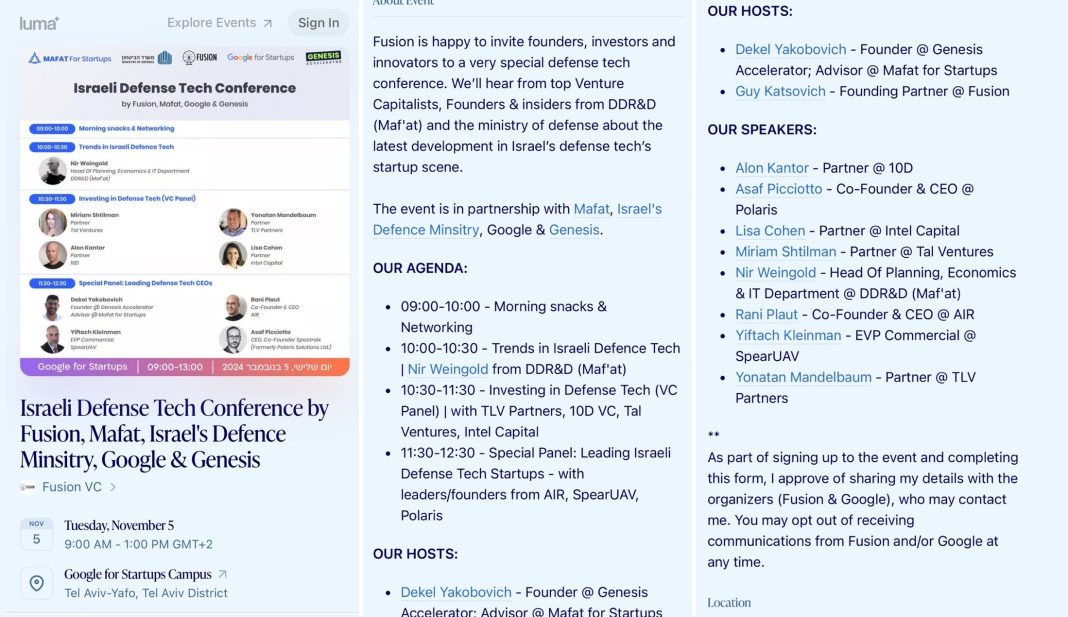In November, a significant event was poised to take place at the Google for Startups campus in Tel Aviv: the Israeli Defense Tech Conference. This gathering was designed for tech entrepreneurs, investors, and innovators eager to delve into the intersection of technology and defense, particularly in the context of Israel’s military landscape. Co-sponsored by notable entities such as Google, Fusion Venture Capital, Genesis (a startup accelerator), and the Israeli military’s Directorate of Defense Research and Development (DDR&D), the conference promised to be a hub for networking and knowledge-sharing.
However, the narrative took a curious turn when inquiries were made about the event. Shortly after questions were raised, the event page vanished from the RSVP app Luma. This sudden disappearance raises eyebrows, especially considering that Google was prominently featured as both the host and a co-sponsor. Andréa Willis, a spokesperson for Google, stated, “Google is not associated with this event,” but did not clarify how this could be the case when the company was listed as a key participant. The lack of responses from other sponsors only deepened the mystery surrounding the event.
This incident is not an isolated one. It follows a pattern of Google attempting to obscure its connections with the Israeli military amid ongoing protests. For instance, in July, Google’s name was quietly removed from the website of another conference focused on IT for the Israel Defense Forces (IDF). Organizers claimed this was a mistake, yet internal documents contradicted that assertion, revealing Google’s involvement as a co-sponsor. Such discrepancies suggest a deliberate effort to distance the company from its military affiliations, particularly in light of mounting public scrutiny.
The Israeli Defense Tech Conference was set to feature prominent speakers, including Nir Weingold, head of planning and IT for DDR&D, who was expected to discuss emerging trends in Israeli defense technology. Attendees would also hear from venture capitalists focused on investing in military startups, including companies like SpearUAV, known for its surveillance and explosive drones used by the Israeli military, and Spectralx, which produces military-grade sensors and drones. These companies exemplify the growing intertwining of technology and defense, raising ethical questions about the implications of such partnerships.
Moreover, the event was to include venture capital firms that have invested in companies with ties to the U.S. military, albeit without publicly disclosed contracts with Israeli forces. For instance, Tal Ventures supports Magnus Metal, a winner of a U.S. Department of Defense competition, while Intel Capital backs Syntiant Corp, which has secured contracts with the U.S. Defense Innovation Unit. This illustrates a broader trend where venture capital firms are increasingly drawn into the defense sector, potentially blurring the lines between commercial innovation and military applications.
The backdrop of these developments is a series of protests against Google’s involvement in Project Nimbus, a $1.2 billion contract with Amazon to provide cloud services to the Israeli government. Activist groups like No Tech for Apartheid have mobilized tech workers and advocates to challenge this partnership, arguing that it facilitates military operations that contribute to ongoing conflicts. The protests have gained momentum since 2021, with Google employees publicly voicing their opposition to the project, leading to significant unrest within the company.
Despite Google’s assertions that Project Nimbus is not intended for military use, evidence has emerged indicating a close relationship between the project and the IDF. This contradiction has fueled further protests, including sit-ins at Google offices and the firing of employees who participated in demonstrations. Such actions highlight the tension between corporate interests and ethical considerations in the tech industry, particularly when it comes to military collaborations.
As the narrative surrounding the Israeli Defense Tech Conference unfolds, it serves as a microcosm of the larger debate about the role of technology in modern warfare and the responsibilities of tech companies in navigating these complex relationships. The disappearance of the event page may reflect a broader strategy to manage public perception, but it also underscores the urgent need for transparency and accountability in the tech sector. As we move forward, the intersection of technology, defense, and ethics will continue to be a critical area of focus, demanding scrutiny from both the public and the industry itself.


